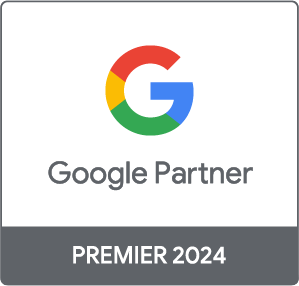SEO trends and forecasts for 2024
There were many surprises in 2023 in terms of SEO, given the continual changes made to the Google algorithm, the launch of Search Generative Experience, changes in the economy and a lot of other developments.
Will SEO be a calmer field in 2024, or was last year just a taste of what’s to come?
Here are the trends and our forecasts for 2024, which is shaping up to be just as interesting as 2023.
- SEO as a preferred ally for customer-centric marketing
- Generative AI with Search Generative Experience
- The integration of AI into processes
- The importance of structured data
- An evolving view of data and performance
- Notable search behaviours
1. SEO as a preferred ally for customer-centric marketing
In the new paradigm we’re experiencing with less data, particularly due to the disappearance of third-party cookies and the arrival of Law 25 in Quebec, companies will redouble their efforts to obtain visibility on consumer behaviour.
Less high-quality data means your digital marketing strategies will be affected, especially in paid channels.
SEO has an important role to play in today’s context in several ways:
-
It’s the number one acquisition channel worldwide and therefore a top source of data: 53.3% of all website traffic comes from organic search.
-
It offers indispensable support for improving your understanding of the consumer. The loss of data doesn’t really affect SEO data, compared to other channels, and therefore SEO should be valued, especially with the return of customer-centric marketing.
-
SEO can support paid channels when it comes to understanding the consumer.
-
It must also support the acquisition of primary persistent identifiers.
2. Generative AI with Search Generative Experience
In May 2023, Google launched a beta version of Search Generative Experience (SGE). Accessible today from many countries, though still an exploratory version, it provides a new way of searching for and obtaining information.
Although it is not known whether access to the beta version will be extended to other countries, including Canada, or whether it will be integrated into search results, we already have a glimpse of the consequences it will have on current SEO methods.
The goal of SGE is to provide answers to user needs a lot faster.
To accomplish this, Google will offer immediate answers by interpreting the richest, most relevant content. Access to all of the content and websites should still be guaranteed with organic links and source references.
Example of a search result with Google SGE
For shopping-related requests, Google will also present information that helps users make a decision, information that has been taken directly from Google Shopping Graph (Google Merchant Center).
Example of a transactional search query with Google SGE
Based on this information, it’s possible to draw a few general conclusions on how this affects SEO:
-
Search intention and user requests should be the focus of consideration. Google aims to be the most precise in its answers, while taking context into consideration even more than before. So this points to nothing new in this sense for 2024; it will remain essential to understand the user and accentuate long tail keywords and niche content.
-
Content will still need to be well structured and focused on user needs, thereby ensuring a high level of quality to make it stand apart.
-
Advice and recommendations will have even more influence on the visibility of your brand and website. Positioning yourself as a recognized expert in your field is a big plus.
-
Local visibility should also continue to be worked on in order to be quoted by the AI. Available details on an establishment and its popularity, above and beyond company profiles, will play an essential role in the evaluation.
-
Online retailers should continue to pay particular attention to highlighting their products.
Example of a local search query with Google SGE
3. The integration of AI into processes
AI has been the object of everyone’s attention for the past several months, and won’t cease to be any time soon.
Google has taught us that we need to constantly question our methods, re-evaluate our quality criteria and enhance our offering to satisfy ever-increasing expectations. This is still the case with AI, which really benefits from being integrated into processes and practices to get the most out of it.
And getting the most out of it is the point. In 2013, Google was aware of 30 trillion pages, increasing to 130 trillion in 2016, and this upward ascent shows no signs of stopping with AI, which facilitates the creation process. We are all familiar with the mass generation of content by AI. In 2024 its implementation will be smarter. We’ve witnessed the testing, the failures, the improvements in our understanding and finally the first benefits of AI. In 2024 this process of deepening our understanding will continue, but this time we have reference points.
The quality and value of the information will take precedence over quantity.
To get there, it’s essential to highlight the people using AI. The content creator still needs to be a person to ensure its quality, unique character, brand affiliation and relevance. Sharing opinions and guidance about content as well as its personalization will become essential.
Beyond content, gains in productivity and a reduction in errors through AI support for repetitive tasks in SEO will also be explored. Observation, technical monitoring, loading time and structured data are all possibilities when working together with AI.
4. The importance of structured data
In 2024, structured data will continue to assume importance for the following reasons:
-
Highlighting professionals and content creators grounds content in expertise and legitimizes the authenticity of a work. Structured data for individuals should therefore be used to send positive signals and provide legitimacy (EEAT, or “experience, expertise, authoritativeness and trustworthiness”).
-
The display of search results is constantly evolving. In 2022, names of websites began appearing in results, for example. Structured data lets you indicate important elements relating to your brand and website so you can maintain control.
-
With SGE, structured data will become more important to facilitate comprehension by robots and AI. It enables faster interpretation and evaluation of information.
5. An evolving view of data and performance
Search habits evolve, and so do marketing practices. The attention paid to data and performance is also driving these changes.
The days of rankings and keywords as the sole indicators of performance have passed.
Keyword rankings remain a strong indicator of SEO performance, but they need to be put in context. Zero-click results, Search Generative Experience, chatbots and the emergence of platforms newly operating as search engines are all good reasons for contextualizing data and re-evaluating our view of performance.
Items that should be considered in SEO to understand performance:
-
Consistency of content in terms of intention
-
Market coverage with the content offering
-
Customer journey and user experience
-
Content performance
-
Measurement of ROI, consideration, engagement, popularity and retention
SEO can no longer just be correlated with an organic ranking that infers conversions.
6. Notable search behaviours
Last year, TikTok and YouTube had already made an appearance in SEO trends for being social networks used as search engines, especially by Generation Z. The trend has continued and even grown to encompass other platforms.
ChatGPT, Microsoft’s Bing chatbot, SGE… the information sources are multiplying. Formats also need to diversify in order to appear where they are needed.
The formats to be prioritized in 2024 are:
-
Video, by far the most preferred format by Generation Z
-
Long-form content, which will provide information with high added value
-
Conversational-type content such as FAQs or articles containing tips that answer questions and have, for example, a short-paragraph or bullet-point structure
-
Irrespective of the specific format mentioned above, content must fulfill a well-identified need to be relevant.
Finally, 2024 promises to be a continuation of 2023’s shift towards natural search. Changes in our industry and our practices are currently underway so that we can continue to improve our approach to users.

.jpg)











